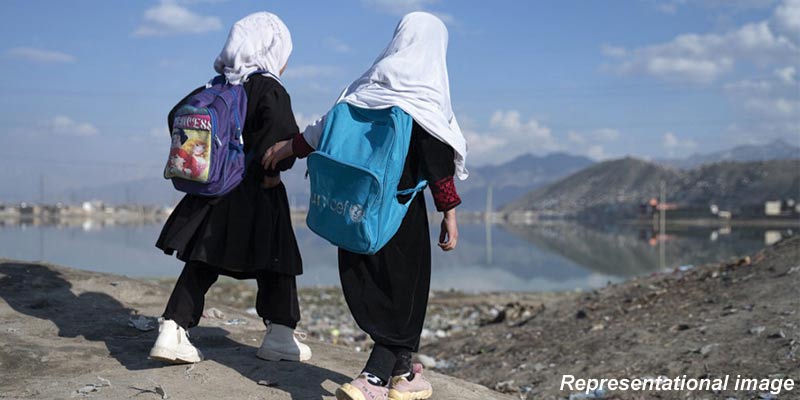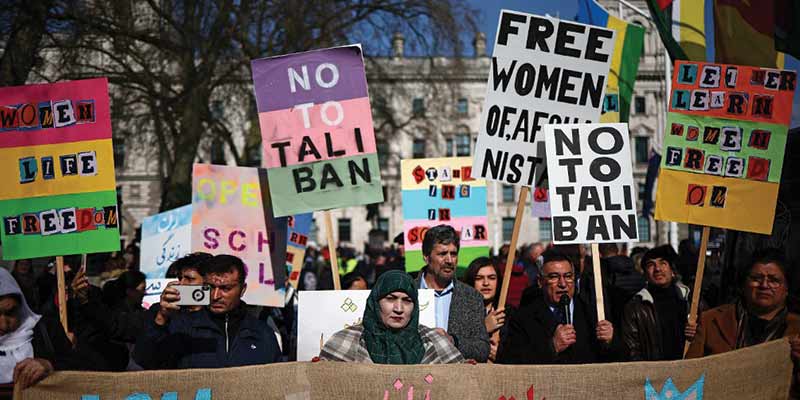- World
- Jun 28
- Maria Mathew
Explainer - Gender apartheid
The oppression of women and girls in Afghanistan since the Taliban takeover in August 2021 is unmatched in terms of scale and generational impact, according to a new update on gender discrimination in the country from UN Women.
While there is no conventional legal framework currently in place in Afghanistan, a series of written and verbal decrees issued by the de facto authorities have forcefully curtailed the freedoms of women and girls.
The decrees founded on the Taliban’s interpretation of Islamic law dictate women’s attire, strictly limit their movement and restrict access to education and professional opportunities, in effect eliminating their voices from public spaces.
This discrimination will lead to inevitable long-term consequences.
In the UN, experts have stressed that gender apartheid be recognised as a crime against humanity.
Iran’s proposed Bill titled ‘Support the Family by Promoting the Culture of Chastity and Hijab’ sanctions new punishments for women and girls who fail to wear the headscarf, or hijab, in public.
In both cases, experts have used the concept of ‘gender apartheid’ as a framework to legally address the discrimination faced by women and girls in these countries, advocating for its recognition as a crime against humanity.
What is ‘gender apartheid’?
As a concept, gender apartheid was first invoked in 1999, against the backdrop of Taliban’s capture of Afghanistan and its set of restrictions on women, including “exclusion of women from society, employment and schools, obligation for women to wear the burqa in public and restrictions on travel with men other than members of the family”.
With Taliban’s takeover of Afghanistan since 2021, while the de facto authorities have reassured their commitment to women’s rights in alignment with Islamic values and Afghan culture, their edicts, laws and policies on women and girls are increasingly being recognised by the international community as being tantamount to putting in place a system of gender apartheid.
The Woman, Life, Freedom movement in Iran galvanised widespread international attention to the systematic, institutionalised nature of gender discrimination and persecution suffered by women at the behest of Iran.
In Afghanistan, since June 2023, the de facto authorities have passed 53 edicts restricting women’s rights and freedoms, including the right to seek education, employment and engage in political and social life.
The UN Special Rapporteur on the Situation of Women and Girls in Afghanistan reports that the country remains the only nation in the world where girls are denied education beyond primary level. Women are not allowed to pursue professional training, work in non-governmental or international organisations and to go into work without a male chaperone.
Women have been denied access to many elements of public life, including public baths, parks and gyms, making women’s mobility severely restricted and possible with the presence of a mahram, a male relative, to travel more than a small radius from their homes.
Those who advocate for gender equality, both men and women, have been subjected to flogging.
Within the family sphere, the instances of forced and/or child marriages have intensified. In the 14 months between December 2022 and February 2023, the International Organisation for Migration received 578 reports of forced marriages, of which 361 were child marriages, as many families thought it was “better to sell a child into marriage than for her to die of starvation”.
Reports of depression and suicide amongst women and girls are widespread, contrary to Taliban’s claims that suicides have decreased and mental health has improved since 2021.
One former student in Afghanistan, interviewed for the Special Rapporteur’s report said, “women are imprisoned, they cannot work, study or go out. We are depressed”.
Similarly, the Report of the Special Rapporteur on the Situation of Human Rights in Iran has expressed grave concern over the draft Bill to ‘Support the Family by Promoting the Culture of Chastity and Hijab’ and its imposition of strict measures against improper veiling.
The report likened the Bill to a form of gender apartheid, where authorities “appear to be governing through systemic discrimination with the intention of suppressing women and girls into total submission”.
Campaigns to end gender apartheid
In January 2023, in his address to the Security Council, the Secretary-General of the United Nations categorically condemned the Afghan de facto authorities’ “systemic attacks on women’s and girls’ rights and the flouting of international obligations which are creating gender-based apartheid”.
In March 2023, alongside the International Women’s Day, ‘End Gender Apartheid Campaign’ was launched by Iranian and Afghan human rights defenders, civil society activists and international jurors, which called for global recognition for the crime of gender apartheid.
In September of the same year, Under-Secretary General and Executive Director of UN Women, called for codification of gender apartheid in international law, highlighting that the systematic and planned assault on women’s rights should be “named, defined and proscribed in our global norms, so that we can respond appropriately”.
At the recently concluded session of the Human Rights Council in Geneva, the Special Rapporteur on the Situation of Human Rights in Afghanistan has called for codification of gender apartheid as a crime against humanity and as a human rights violation. Steps are underway to include gender apartheid as a crime against humanity under the draft articles on prevention and punishment of crimes against humanity currently under consideration by the Sixth Committee of the General Assembly.
Proposed legal definition of ‘gender apartheid’
The Working Group on Discrimination Against Women and Girls has proposed to define gender apartheid as inhuman acts “committed in the context of an institutionalised regime of systematic discrimination, oppression and domination by one group over another group or groups, based on gender, and committed with the intention of maintaining that regime”.
This is based on the definition of racial apartheid enshrined in Article 7(2) (h) of the Rome Statute. The commission of gender apartheid runs contrary to the UN Charter, violates the principle of equality and non-discrimination, and the fundamental animating spirit of international human rights law.
Gender apartheid, when seen through the lens of what is unfolding in Afghanistan and Iran, is not merely a concept, but a lived reality for the women and girls in these countries.
The codification of gender apartheid as a crime against humanity gives an entry point for the international community to address the sometimes slow-burning, the sometimes catalytic gender backlash all over the world and to restore the truncated freedoms and rights of women and girls across the globe, most urgently in Afghanistan and Iran.
(The author is an international development professional, based in New York and works on population and development issues, with a special focus on gender equality. The views expressed here are personal.)


